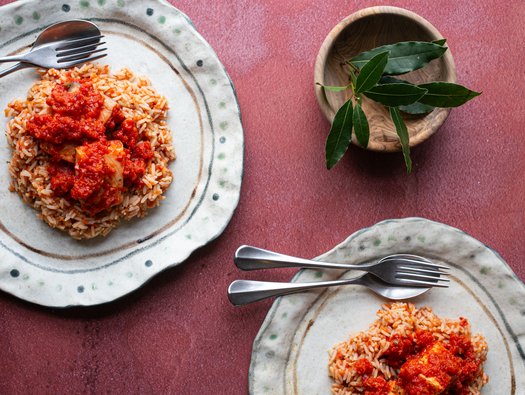Nigerian jollof rice with salmon


6 skin-on salmon fillets (120g each)
2 x zero-salt vegetable stock cubes
1 teaspoon medium curry powder
2 chillies (red or green), finely chopped
400g can chopped tomatoes
1 red pepper, deseeded and chopped
2 onions, peeled and chopped
2 spring onions, chopped
2 red chilli peppers
6 tablespoons olive oil
1 teaspoon tomato purée
6 cloves garlic, chopped
3cm fresh ginger root, finely chopped
4 bay leaves
2 teaspoons dried mixed herbs
2 teaspoons curry powder (medium or hot, depending on preference)
450g easy-cook white rice, rinsed twice
200ml zero-salt chicken stock
For the salmon, start by mixing the crumbled stock cubes with the curry powder and chillies, then cover the salmon steaks in the mix and marinade for half an hour.
To make the rice, put the chopped tomatoes, peppers, onions, spring onions and chillies into a blender with a little water and roughly chop. Heat the olive oil in a large saucepan and cook the tomato purée over a low heat for 5 minutes. Add the garlic, ginger and bay leaves and cook, stirring continuously, for another 5 minutes before adding the blended pepper mix along with the mixed herbs and curry powder. Cook over a low to medium heat for 40 to 45 minutes, stirring regularly, to reduce the sauce.
Parboil the rice in a pan of boiling water for 10 minutes and then drain (this helps remove the starch). Once the sauce has reduced, add the drained rice with 200ml zero-salt chicken stock. Put a lid on the pot and cook over a low heat for a further 20 to 30 minutes.
Whilst the rice is cooking, remove the salmon steaks from the marinade and grill for 15 minutes, or until thoroughly cooked, turning halfway through the cooking time.
Serve the salmon with the jollof rice.
Rice is the main source of carbohydrate in this dish. The value has been provided for those trained in insulin adjustment.
This recipe is low in potassium, when following quantities and serving sizes given, so is suitable if you have been advised to reduce the amount of potassium in your diet. It is also low in phosphate, but does contain some, mainly provided by the fish, so if you have been prescribed a phosphate binder, take as directed.
This recipe provides a good source of protein. If you have been advised to eat less protein, you may wish to halve the amount of fish and substitute with 100g green beans or a tin of kidney beans (drained and washed).
By giving us your email address, you're giving us permission to send you the latest news from Kidney Care UK. Further information about how we protect and use your personal data is available in our Privacy policy. If you would like to change the way we communicate with you at any time please email [email protected]. You can unsubscribe at any time by using the link at the bottom of every email we send.